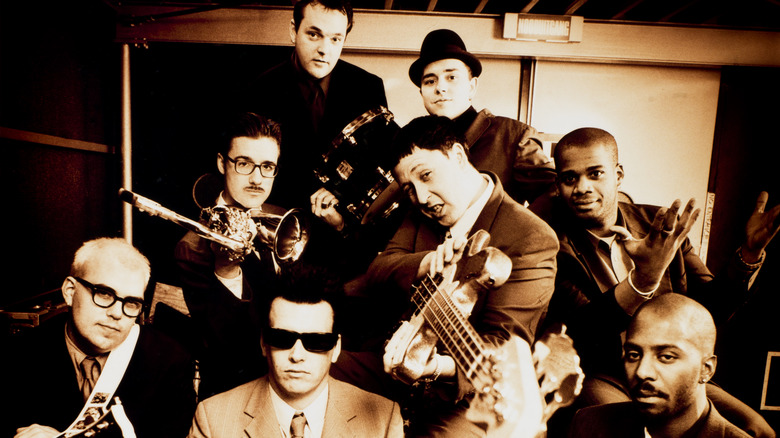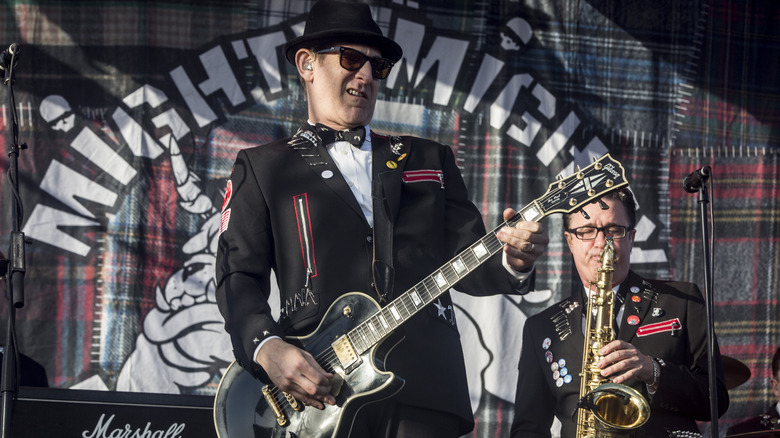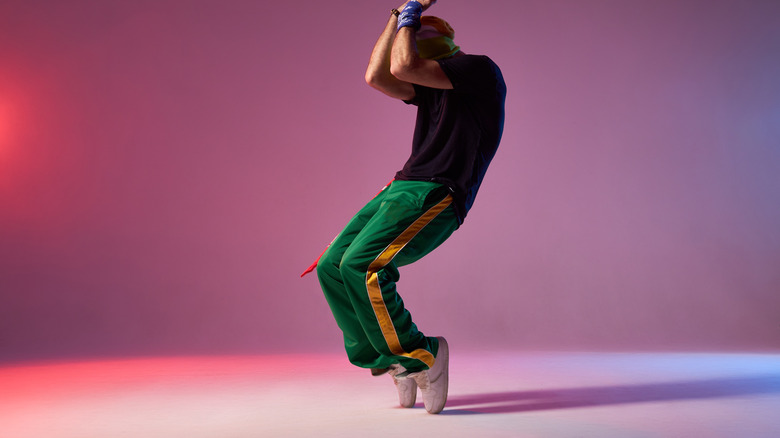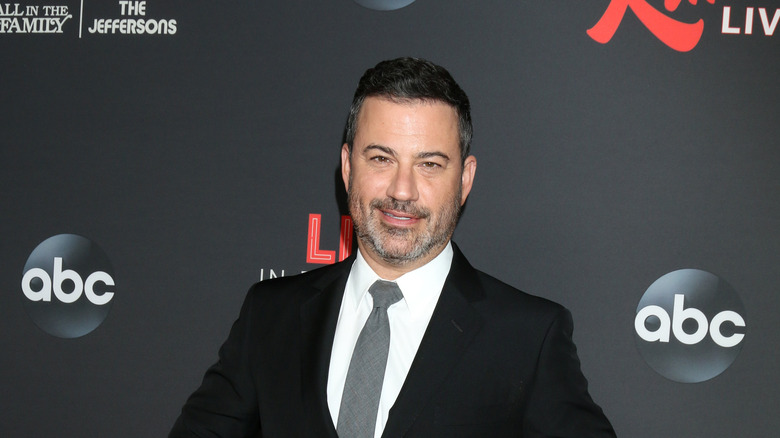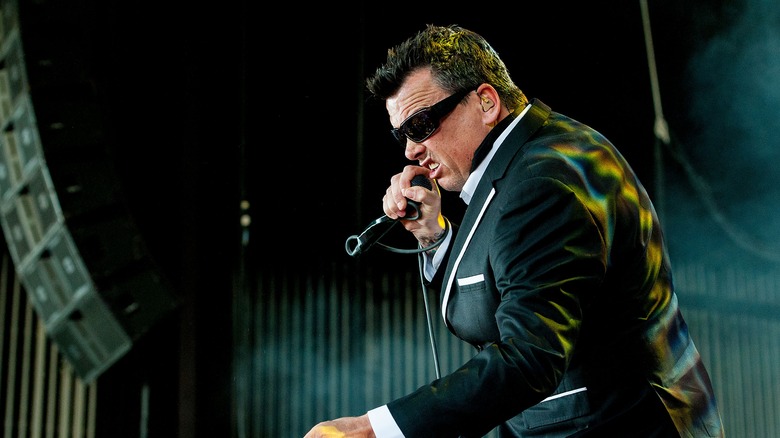The Untold Truth Of The Mighty Mighty Bosstones
Third-wave ska seemingly went from chart-topping phenomenon to worn-out punchline overnight in the late-1990s — presumably because its inherent caricature of joy was both infectious and extremely easy to parody — but at least some of its acolytes are still around and skanking just as hard as ever. Chief among them, no doubt (do you see what we did there?), were the Mighty Mighty Bosstones, who announced their breakup in a Facebook post in January 2022 (via Boston). While they've never surpassed the success of their 1997 alternative chart-topping single "The Impression That I Get," the Bosstones continually cranked out albums longer than a lot of us have been alive — most recently, "When God Was Great," which at least some critics (including Liza Lentini over at Spin) have hailed as their best album to date.
How does a band known for a flash-in-the-pan genre stay together — and relevant — for multiple decades? Apparently by employing a full-time dancer, being ahead of the vinyl record trend, and wearing a lot of plaid. Or at the very least, those things don't seem to hurt.
The Bosstones were only Mighty Mighty because of a conflict with an a cappella group
The Bosstones were a group that proudly wore their Boston roots on their (plaid) sleeves, so it's not terribly difficult to guess where they got their name. Boston + Boss + Tones = Bosstones. A great way to advertise your hometown spirit, your awesomeness, and the fact that you play music all at once. But ... what makes them "mighty"? And why are they mighty ... twice?
The answer is a tale as old as time: The band realized, too late, that another musical artist had been using their name. The group had originally christened themselves just "The Bosstones," but around the time they began recording, discovered that another group called the Bosstones had done some recording a quarter-century prior.
The (non–Mighty Mighty) Bosstones were a doo-wop group who had recorded only one single in 1959, "The Mope-itty Mope." The single was almost entirely forgotten, but the band sensed that sticking with their original name could lead to legal or commercial problems in the future. A bartender friend suggested they add "Mighty Mighty" to their moniker (the repetition was apparently arbitrary), and the band had solved the problem and invented one of history's catchiest band names all at once (via the Boston Herald).
The story behind the plaid
Part of the Bosstones' enduring iconography was their apparent love for all things plaid. The kilt-ready pattern was present in the backdrops for their concerts, on their album covers, and even in their music videos. Most notably, the band was known for playing all of their shows in full plaid business suits — no doubt working up a sweat in the process. So what's the deal with all the plaid?
Most likely, the actual impetus was just a case of the band recognizing good branding when they saw it, but several members of the group have offered more colorful explanations. Per lead singer Dicky Barrett, it was a reaction against the musical trends of the early-to-mid-1980s. "What was going on musically when we started was all that glam-metal s***," he told the Boston Herald in 2007. "We were wearing cummerbunds and plaid. We were saying f*** you to everybody, and people liked it."
Bassist Joe Gittleman, on the other hand, once told the Los Angeles Times that the choice was much more a goof on the band itself. "We were not musically proficient," he said, of the band's early days. "We wanted to offend people's sense of sight as well as sound, so we started packing plaid."
As for wearing suits, according to dancer Ben Carr, those were just a matter of respecting the audience. "If people are going to pay their hard-earned money to come see us, we're gonna dress up for them," he told Vice.
The Bosstones featured a full-time dancer
And speaking of dancer Ben Carr — yes, one of the members of the nine-piece ensemble was a full-time dancer. Other musical acts have been known to employ "back-up dancers" for touring purposes, but the Bosstones were one of the few bands to have a full-time member whose one job was to dance around on stage and hype up the crowd. Carr also served the band as a tour manager and roadie, and occasionally contributed backing vocals, but his main job was just to jump around on stage for the entire set.
How did Carr — a man with no training or experience as a dancer and seemingly nothing in his favor other than an irrepressible energy — land what must be the best gig in the universe? Mostly just by being too young to get into a bar one time. "I was a roadie, basically," he told Vice. "A club said you gotta be 21 or in the band so the guys were like 'He's in the band!' and they said well you gotta get up on stage now and I just kind of went with it. I knew all the songs, I would go to every practice so I sort of got up there and jumped around and sang some backup vocals just so I could stay in the show and not get kicked out."
It worked well enough that the band kept him as an official member — for decades.
The Bosstones and Jimmy Kimmel: a love story
In between gigs — and especially during the Bosstones' hiatus between 2004 and 2007 — the members of the group have done some other pretty interesting things. Lead singer Dicky Barrett, in particular, once starred as classic rock 'n' roll musician Bill Haley in the made-for-TV movie "Shake, Rattle, and Roll" (via ABC). His most impressive non-Bosstones accomplishment, though, is serving as the announcer for late-night variety show "Jimmy Kimmel Live!" since 2004. Jimmy Kimmel, in turn, once returned the favor by joining the Bosstones on stage to play bass clarinet on "The Impression That I Get" for a show in L.A. (see it on YouTube).
In addition to sharing the stage with Kimmel, the Bosstones once shared the stage with Elmo (in a not particularly well-reviewed ABC special called "Elmopalooza") and founded a vinyl record label 20 years before the vinyl craze began. In 1993 — when CD sales were skyrocketing and vinyl was at its absolute nadir — Barrett and company started Big Rig Records as an outlet for putting out Bosstones content on LPs. Big Rig did well enough that it's still around, and even putting out albums by other groups (most of Sum 41's catalog, for example) — so give them credit for being far ahead of the curve there.
Even after moving to L.A., Barrett kept his Boston phone number
Even as they became something of a sensation, the Bosstones never lost sight of their Boston roots. In 2021, Barrett told Spin that he had hung onto the same cell phone number since 1994. "I just kept it everywhere I went. It's fun to drop on people. If you run into somebody in L.A. and you give them the phone number, and he's like, 'Oh, J*sus Chr*st, dude. You keep it real.'"
In truth, it's hard to think of a Boston group with much more hometown pride than the Bosstones. In addition to recording an entire song about controversial Boston mayor James Michael Curley (a politician known for fighting for the downtrodden, but also for reportedly being so corrupt that he served five months of his term from a federal prison), the Bosstones continually tried to give back to the city. For 22 years, they hosted the Hometown Throwdown (via Punk News), a music festival that showcases local punk and ska acts. Even mega-hit "The Impression That I Get" was originally recorded for the charity album "Safe and Sound," which supported local women's health and education efforts (via AllMusic). A racially integrated band, the Bosstones also featured information booths from the Anti-Racist Action League at most of their shows (via the Boston Herald).
